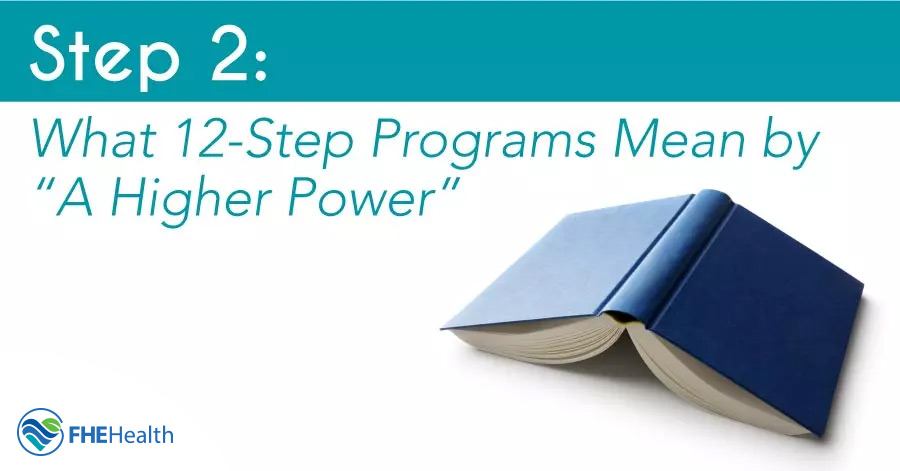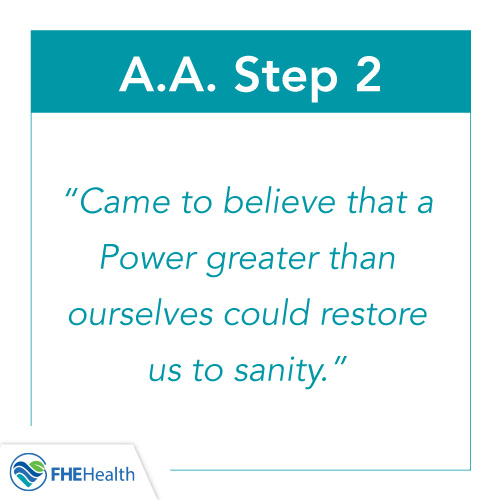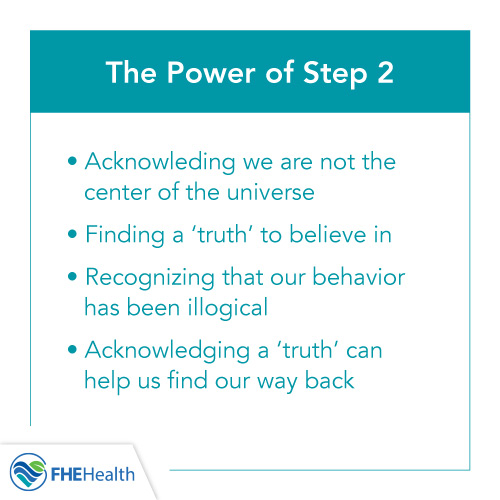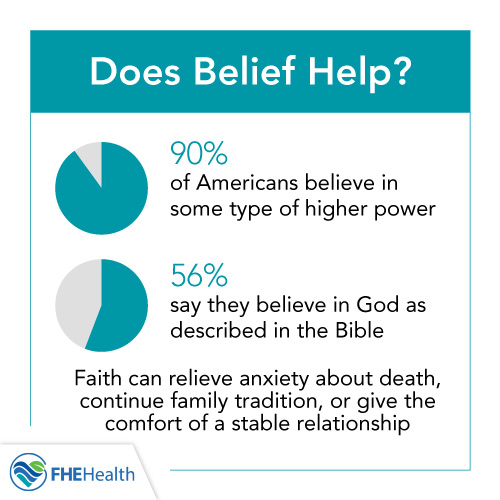
The 12 steps to recovery are one of the most successful tools used today to help people overcome alcohol and drug addiction. Each step defines a task or requirement for a person with an addiction that they need to work through to change their outlook on using and to empower them to maintain sobriety.
Step 2 of the Alcoholics Anonymous program, which can also be used for any substance use disorder, involves turning to a higher power for support. The guidelines indicate that you need to let go of your need to control your life and instead trust in a higher power. Specifically, step 2 reads, “We came to be aware that a Power greater than ourselves could restore us to sanity.”
Over time, the 12-step of AA has built in more flexibility than the original text referencing God, but there’s still a need to believe in a power greater than yourself. At FHE Health, the 12-step program is one component of the care we provide to you.
What Is a Higher Power in 12-Step Terminology?
 For some people, the thought of having to believe in or count on a higher power to help them reach recovery seems like a bridge they are unwilling to cross. The 12-steps are telling you that you must become a Christian, or stop being an agnostic to be sober. The term “higher power” is loosely defined as something that has greater power and control than we do. For some people, that means God. For others, it means spirituality on a looser level. Some people believe in a supreme being; others believe in more than one. For others, it means simply acknowledging that you are not God, that there must be something more powerful than you in the universe.
For some people, the thought of having to believe in or count on a higher power to help them reach recovery seems like a bridge they are unwilling to cross. The 12-steps are telling you that you must become a Christian, or stop being an agnostic to be sober. The term “higher power” is loosely defined as something that has greater power and control than we do. For some people, that means God. For others, it means spirituality on a looser level. Some people believe in a supreme being; others believe in more than one. For others, it means simply acknowledging that you are not God, that there must be something more powerful than you in the universe.
What’s the right answer? In the 12-step program, it’s less about defining what the higher power is and more about determining what it means to you. In this step, the focus is on the spiritual aspect of substance abuse and recognizing that something more powerful exists and that you can look to that power as a guidepost. It would be awfully arrogant, after all, to assume that we are the most powerful force in the universe, that there is no ‘north star’ for us to look to. A focus of this step can simply be taking on the humility of this knowledge.
The 12-step program is designed to help you to work through a life-changing process with some level of spirituality as a component. Yet no two people will have the same path towards recovery. It’s okay and even ideal for you to define what your path is.
The Higher Power Dilemma
It’s important to not be too concerned about the “higher power” component of Step 2. You don’t have to convert to a specific religion or engage in specific rituals. There are no restrictions on what the higher power is, but it tends to be important to have one.
Restoring Sanity Concerns
Some people have problems with the second portion of step 2, which states that this higher power has the ability to restore sanity because they think this implies they’re insane in some way. While not a clinical definition of insane, continuing to do something day after day that makes your life worse does indicate a need for serious reflection at the very least. Stripping away the medical definition, by the time someone is seeking help from the 12-steps, it’s not a stretch to call our behavior ‘insane’.
Recognize the goal of step 2: needing a higher power of some type to help you to get back to making wise decisions for yourself and your future.
Why Do Most People Need to Believe in a Higher Power?
 A Pew Research Center survey found 90 percent of Americans believe in some type of higher power. Of those, 56 percent say they believe in God as described in the Bible, and just one in 10 people say they don’t believe in any type of higher power.
A Pew Research Center survey found 90 percent of Americans believe in some type of higher power. Of those, 56 percent say they believe in God as described in the Bible, and just one in 10 people say they don’t believe in any type of higher power.
Why do most people believe in a higher power? Some believe that having faith determines what happens when they die. Some believe in religious affiliations because of family traditions. In still other situations, people believe in a god or gods because it gives them hope and a possibility of the outcome they desire.
What people believe differs significantly. Following your faith, no matter what that is, gives you a sense of peace. It also allows you to believe anything could happen. In step 2, we realize this higher power is capable of giving us back a life without dependency. That’s valuable to a person who may be struggling just to get through the day. Having that knowledge that there is someone or something out there to help you can be empowering.
How to Choose Your Higher Power
Perhaps you don’t have a background or tradition of religious belief or you’re looking for a new outlook. At step 2, it’s important to define what your higher power is. If you’re having trouble doing so, consider the following questions:
- Do you believe in God or another type of spiritual deity?
- If you don’t believe in God in the traditional form, what do you believe in? For example, do you believe in nature or love?
- Can you connect in a spiritual manner to anything else, such as music or nature itself?
Can the 12 Steps Work for Atheists?
 Perhaps you’re just not willing or wanting to name a higher power. Some people are able to believe in reality instead, and this can work as your higher power. For example, do you believe that you cannot physically take a drink or use drugs without abusing them? Do you believe that if you use drugs, your spouse will leave you? In this case, choose to believe in reality. You don’t have to believe in God to use the 12-step program successfully.
Perhaps you’re just not willing or wanting to name a higher power. Some people are able to believe in reality instead, and this can work as your higher power. For example, do you believe that you cannot physically take a drink or use drugs without abusing them? Do you believe that if you use drugs, your spouse will leave you? In this case, choose to believe in reality. You don’t have to believe in God to use the 12-step program successfully.
Not Ready to Make This Decision?
The pain and trauma of life can make it hard to believe in a higher power. In the early stages of addiction recovery, you may not have a lot of confidence that a higher power is there to help you. When you work with a treatment specialist, you’ll gain more insight into why you have these feelings and what you need to do to work through them. After that point, you’ll be in a better position to name a higher power that works for your unique needs.
Seeking Help for Substance Use Disorder at FHE Health
Making a decision like this is a difficult one, but it’s one you don’t have to make alone. Instead, turn to help from a licensed, experienced drug and alcohol treatment professional. Our team at FHE Health is here to help you.
Further Reading: See our articles on…
- Why the 12-step Program Still Works
- Step 1: Why the 12-step Journey Begins with Powerlessness
- Step 2: What is a Higher Power?
- Step 3: God as you Understand Him
- Step 4: Your Moral Inventory
- Step 5: Admitting Your Wrongs
- Step 6: Addressing Character Defects
- Step 7: Removing our Defects
- Step 8: Willing to Make Amends
- Step 9: Making Amends, How to Approach Step 9
- Step 10: Ongoing Inventory
- Step 11: How to Deepen Your Connection with a Higher Power
- Step 12: Sharing Your Spiritual Awakening With Others
- Understanding AA Lingo
- The Principles of AA






